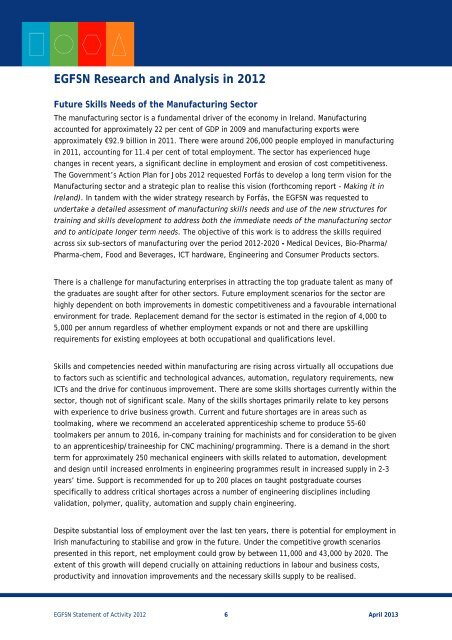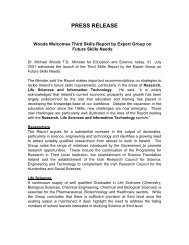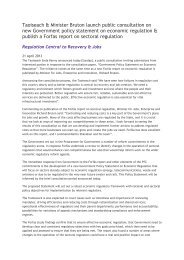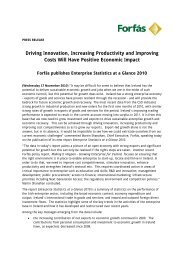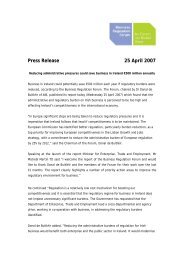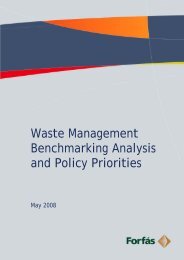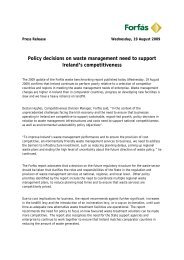EGFSN Statement of Activity (PDF, 29 pages , 416KB) - Skills Ireland
EGFSN Statement of Activity (PDF, 29 pages , 416KB) - Skills Ireland
EGFSN Statement of Activity (PDF, 29 pages , 416KB) - Skills Ireland
You also want an ePaper? Increase the reach of your titles
YUMPU automatically turns print PDFs into web optimized ePapers that Google loves.
<strong>EGFSN</strong> Research and Analysis in 2012<br />
Future <strong>Skills</strong> Needs <strong>of</strong> the Manufacturing Sector<br />
The manufacturing sector is a fundamental driver <strong>of</strong> the economy in <strong>Ireland</strong>. Manufacturing<br />
accounted for approximately 22 per cent <strong>of</strong> GDP in 2009 and manufacturing exports were<br />
approximately €92.9 billion in 2011. There were around 206,000 people employed in manufacturing<br />
in 2011, accounting for 11.4 per cent <strong>of</strong> total employment. The sector has experienced huge<br />
changes in recent years, a significant decline in employment and erosion <strong>of</strong> cost competitiveness.<br />
The Government’s Action Plan for Jobs 2012 requested Forfás to develop a long term vision for the<br />
Manufacturing sector and a strategic plan to realise this vision (forthcoming report - Making it in<br />
<strong>Ireland</strong>). In tandem with the wider strategy research by Forfás, the <strong>EGFSN</strong> was requested to<br />
undertake a detailed assessment <strong>of</strong> manufacturing skills needs and use <strong>of</strong> the new structures for<br />
training and skills development to address both the immediate needs <strong>of</strong> the manufacturing sector<br />
and to anticipate longer term needs. The objective <strong>of</strong> this work is to address the skills required<br />
across six sub-sectors <strong>of</strong> manufacturing over the period 2012-2020 - Medical Devices, Bio-Pharma/<br />
Pharma-chem, Food and Beverages, ICT hardware, Engineering and Consumer Products sectors.<br />
There is a challenge for manufacturing enterprises in attracting the top graduate talent as many <strong>of</strong><br />
the graduates are sought after for other sectors. Future employment scenarios for the sector are<br />
highly dependent on both improvements in domestic competitiveness and a favourable international<br />
environment for trade. Replacement demand for the sector is estimated in the region <strong>of</strong> 4,000 to<br />
5,000 per annum regardless <strong>of</strong> whether employment expands or not and there are upskilling<br />
requirements for existing employees at both occupational and qualifications level.<br />
<strong>Skills</strong> and competencies needed within manufacturing are rising across virtually all occupations due<br />
to factors such as scientific and technological advances, automation, regulatory requirements, new<br />
ICTs and the drive for continuous improvement. There are some skills shortages currently within the<br />
sector, though not <strong>of</strong> significant scale. Many <strong>of</strong> the skills shortages primarily relate to key persons<br />
with experience to drive business growth. Current and future shortages are in areas such as<br />
toolmaking, where we recommend an accelerated apprenticeship scheme to produce 55-60<br />
toolmakers per annum to 2016, in-company training for machinists and for consideration to be given<br />
to an apprenticeship/traineeship for CNC machining/programming. There is a demand in the short<br />
term for approximately 250 mechanical engineers with skills related to automation, development<br />
and design until increased enrolments in engineering programmes result in increased supply in 2-3<br />
years’ time. Support is recommended for up to 200 places on taught postgraduate courses<br />
specifically to address critical shortages across a number <strong>of</strong> engineering disciplines including<br />
validation, polymer, quality, automation and supply chain engineering.<br />
Despite substantial loss <strong>of</strong> employment over the last ten years, there is potential for employment in<br />
Irish manufacturing to stabilise and grow in the future. Under the competitive growth scenarios<br />
presented in this report, net employment could grow by between 11,000 and 43,000 by 2020. The<br />
extent <strong>of</strong> this growth will depend crucially on attaining reductions in labour and business costs,<br />
productivity and innovation improvements and the necessary skills supply to be realised.<br />
<strong>EGFSN</strong> <strong>Statement</strong> <strong>of</strong> <strong>Activity</strong> 2012 6 April 2013


